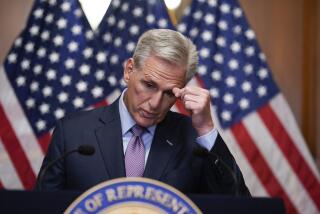Russian Caucus Set Up in Soviet Parliament : Reforms: Conservative group organizes ‘to resist the break-up’ of the country by nationalist factions.
- Share via
MOSCOW — Another crack appeared in the once unified face of the Soviet Communist Party here Friday when a group of deputies representing almost 20% of the Supreme Soviet, or Parliament, announced they had banded together to fight what they described as nationalist threats to the integrity of the country.
The group was immediately seen here as representing a politically conservative, ethnically Russian-dominated counterweight to an older parliamentary faction of liberals demanding more rapid economic and political reform. The liberal faction, known as the InterRegional Group, includes outspoken former Moscow party chief Boris N. Yeltsin.
The new group, calling itself “Soyuz,” or “Union,” announced its formation at a legislative session, following weeks of increasingly open challenge to Moscow’s hegemony in the far-flung republics of an empire originally assembled under the czars.
Secessionist movements in the Baltic republics and violent ethnic unrest, particularly in Armenia, Azerbaijan and Tadzhikistan, are posing one of the most serious tests of the nearly five-year-old administration of President Mikhail S. Gorbachev.
Georgy Komarov, an ethnic Russian deputy from Kirghizia, one of the Soviet Central Asian republics, told the Supreme Soviet that 103 of the 542 members had joined Soyuz in a combined effort “to resist the break-up of the Soviet Union.”
Also, Komarov said, the group intends to defend the rights of all Soviet citizens, regardless of where they live. That was seen as a particular reference to ethnic Russians who make up the largest minority in most of the country’s 14 constituent, non-Russian republics.
Among members of Soyuz, for example, are Yevgeny Kogan and Viktor Alksnis, leaders, respectively, of ethnic Russian organizations opposed to national movements in the Baltic republics of Estonia, Lithuania and Latvia.
“We see all our old friends in this group,” commented Marju Lauristin, a leading Estonian activist. Lauristin is a liberal deputy from that republic and head of its newly formed Social Democratic Party. “They are very active. They are giving a parliamentary form to their imperialistic force, to their conservative force.”
Kogan denied that the new group constitutes a conservative front.
“We are for reform of the country, but also to keep it together,” he said.
And Parliament member Nikolai Engver, considered a liberal on economic issues, commented: “We are against confederation or break-up of the union. But reform must go on.”
Gorbachev advocates an overhaul of the Soviet constitution to give the republics more economic and political autonomy in a federal system. The current session of the Supreme Soviet is expected to take up the issue, along with a number of other sweeping reforms. But the Baltic republics, particularly, are pressing for full independence from Moscow.
Continuing the challenge Friday, the Latvian Parliament urged the Supreme Soviet to consider establishment of separate republican formations of the Soviet armed forces, according to the official news agency Tass. Earlier, the Latvian lawmakers revived the once-independent nation’s old national anthem and voted by a 3-to-1 margin to press its campaign for full nationhood.
Another outburst of national pride occurred in Vilnius, Lithuania, where about 2,000 demonstrators rallied to mark the founding in 1918 of their short-lived independent state. They marched to the offices of the republic’s Parliament, where they turned in their military enlistment cards, according to Lithuanian journalists.
Unrest in Soviet Central Asia spread Friday to the Uzbekistan republic as members of the local Muslim majority clashed with ethnic Armenians in the fabled city of Samarkand, Radio Moscow reported.
The report said that Interior Ministry troop reinforcements were sent in and that a curfew was imposed but that the rallies and demonstrations continue. No immediate details of damage or casualties were reported.
The outbreak in Uzbekistan follows a period of unrest in neighboring Tadzhikistan, where the Kremlin declared a state of emergency this week after five days of rioting. Tadzhikistan is a mostly Muslim region bordering China and Afghanistan where 20 people were killed and 568 were wounded by Interior Ministry count.
Senior officials of the Tadzhikistan Communist Party on Friday refused to accept the resignations of party leader Kakhar Makhkanov and two other officials, arguing that it would amount to capitulation to “extremists” in the republic.
Local journalists complained that the authorities had reneged on an agreement to replace the three in exchange for peace. But Tass quoted non-voting Soviet Politburo member Boris K. Pugo as saying that the agreement stipulated that the republic’s party chief, president and prime minister, would resign only “through lawful channels”--that is, if their resignations were accepted by the organizations that elected them.
Pugo was sent this week to Dushanbe, the republic’s capital, after about 5,000 troops supported by tanks had been sent to the city to deal with the riots. Residents interviewed by telephone said the streets were quiet Friday.
The violence in Tadzhikistan began Saturday night after rumors spread that ethnic Armenians fleeing persecution in Azerbaijan were being moved into the Tadzhik republic and would have priority access to scarce housing. Officials said that the rumors were untrue and that the few dozen Armenian refugees reaching there were staying with relatives.
More to Read
Sign up for Essential California
The most important California stories and recommendations in your inbox every morning.
You may occasionally receive promotional content from the Los Angeles Times.










